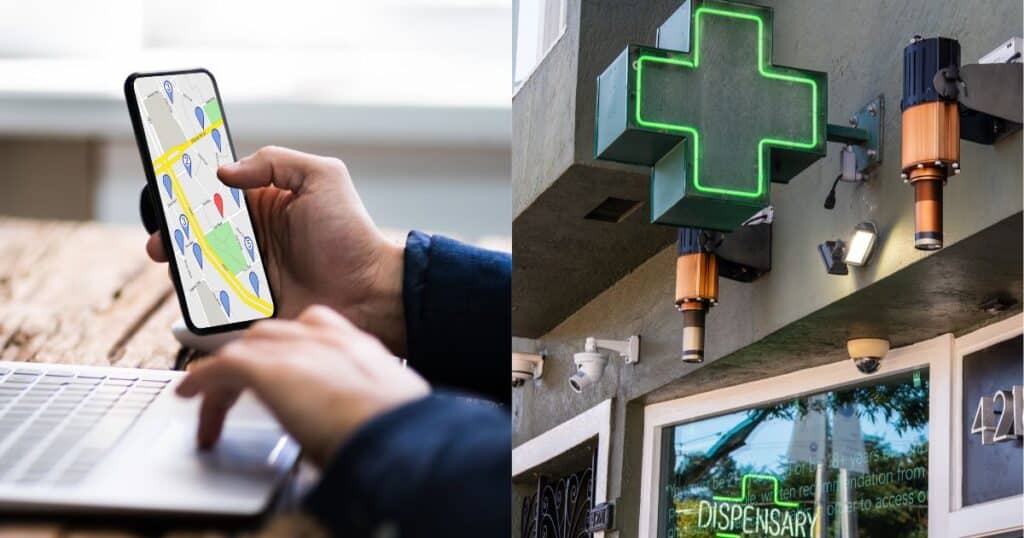The fight against unlicensed cannabis dispensaries has taken a significant turn in Los Angeles County. With the approval of a motion to “deplatform” these unlicensed shops on Tuesday from the Board of Supervisors, the county aims to remove their presence from major online platforms like Google and Yelp. Lawmakers believe this initiative addresses their increasing concerns regarding the detrimental effects of illegal operations on both consumers and legitimate businesses.
Motion to ‘Deplatform’ Unlicensed Cannabis Dispensaries
Introduced by Supervisor Lindsey Horvath and approved by the L.A. County Board of Supervisors, the motion to deplatform illegal cannabis dispensaries is a multi-faceted approach.
First reported by the Los Angeles Times, it instructs several county agencies to prepare reports within three months on potential steps to stop unauthorized cannabis advertising, particularly in the county’s unincorporated areas.
The measure also directs county leaders to urge popular websites like Google, Yelp, and others to voluntarily cease advertising illegal dispensaries and help consumers identify licensed businesses.
Los Angeles County has witnessed a surge in illegal cannabis dispensaries. Despite the legalization of cannabis in California under Proposition 64, the unregulated market continues to thrive. The motion cites a February report by the Pew Research Center that revealed that there are nearly 1,500 cannabis dispensaries in L.A. County, but only 384 of them are properly licensed.
Regulators’ Concerns Regarding the Harmful Effects of Illegal Dispensaries Per The Motion
The motion states that unlicensed dispensaries pose significant dangers to both consumers and the community. Firstly, their products are often untested and may be mislabeled, leading to potential health risks for users.
Moreover, they argue these illegal operations do not contribute to the tax base, depriving the county and state of much-needed revenue. They also encourage the illegal cultivation of cannabis, which they said is often accompanied by severe environmental damage, including deforestation and water resource depletion.
By offering lower prices, these dispensaries undercut the legal market, making it difficult for licensed businesses to compete. Furthermore, the motion states that illegal dispensaries often face violence because they hold large amounts of cash and their operators are less willing to report crimes, which worsens safety concerns within the community.
Directives Issued by the Board of Supervisors
In response to the pressing issue of illegal cannabis dispensaries, the Los Angeles County Board of Supervisors has laid out specific directives within the motion.
- County Counsel Evaluation: The Board has instructed the County Counsel to analyze the feasibility of “deplatforming” illegal, unlicensed cannabis dispensaries. This report is to be submitted in writing within 120 days, providing a detailed assessment of how effectively online visibility can be minimized for these unauthorized entities.
- Strategic Recommendations from Consumer Affairs: The Department of Consumer and Business Affairs’ Office of Cannabis Management, along with the Sheriff’s department, work to formulate strategies that curb unlicensed cannabis advertising and operations. This report, also due in 120 days, will offer actionable recommendations for the County to implement locally or in conjunction with State efforts, focusing particularly on digital advertising in unincorporated areas.
- Engagement with Digital Platforms: The Office of Cannabis Management is collaborating with the Chief Executive Office – Legislative Affairs and Intergovernmental Relations (CEO-LAIR) to draft a 5-signature letter. This letter will request major digital platforms like Google and Yelp to voluntarily stop advertising illegal cannabis dispensaries in Los Angeles County.
The Los Angeles Times contacted several digital advertising agencies for comments, and a Yelp spokesperson responded.
“Yelp believes consumers have a First Amendment right to read and share information about all businesses, even if unlicensed,” the spokesperson said via email. “Allowing users to contribute and see information (including complaints) about unlicensed businesses serves the public interest and provides a resource for regulators to determine whether any particular business has appropriate licenses.”
Effort to ‘Deplatform’ Unlicensed Cannabis Dispensaries Not Unique To LA County
The challenges faced by L.A. County are not unique; for instance, New York has experienced a surge in illegal cannabis dispensaries since adult-use sales became legal and has been actively pursuing them, creating a task force to help with the issue.
In February, per a report from the Associated Press, New York Governor Kathy Hochul pleaded with Google and Yelp to delist illegitimate cannabis dispensaries as the state began rolling out its recreational cannabis industry.
The initial results were not promising, with many illegal dispensaries remaining on the sites while some legal ones were mistakenly removed. Highlighting the complexities of regulating online platforms and what regulators believe is a need for a concerted effort to address the issue.
Los Angeles County’s efforts to seek assistance from major advertising websites to curb unlicensed cannabis shops highlight the complexities of managing legal versus illegal operations. The county’s proactive measures, including engaging platforms like Google and Yelp, aim to reduce the visibility of unauthorized dispensaries and bolster the legal market.
However, this also raises critical questions about the allocation of tax revenues from cannabis sales in California. With over $1 billion generated in legal tax revenue annually, we should examine how officials utilize these funds and why they do not allocate sufficient resources to effectively combat the illegal dispensaries cited as harmful in the county’s motion.

















